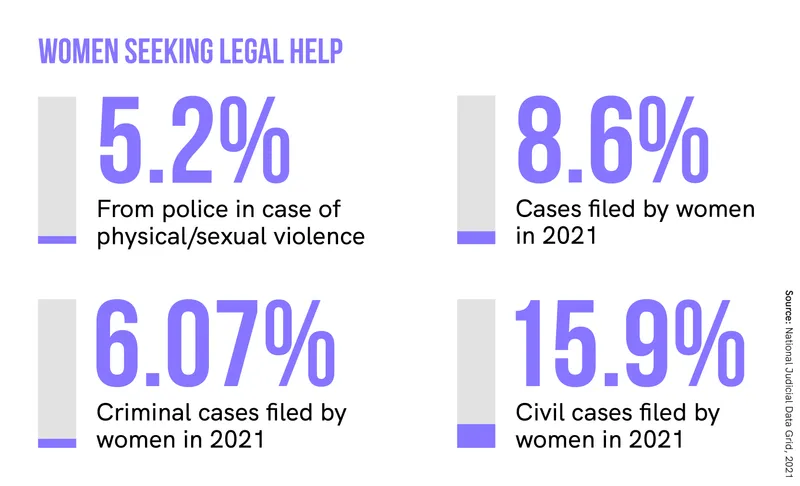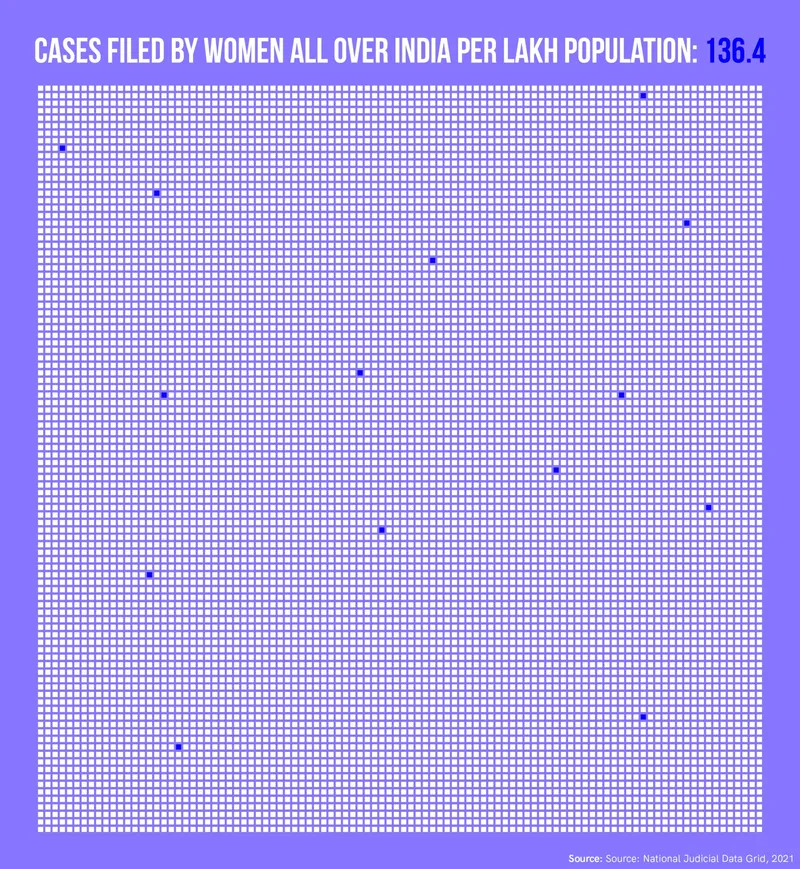Falling apart: How women can navigate social, legal, financial implications of divorce
Women have to often deal with multiple challenges while going through a divorce. Women and experts tell HerStory why having a good lawyer, societal support, mental health counselling, and support groups are important.
With less than 1% of marriages annulled, India boasts one of the lowest divorce rates in the world. Does that mean we are a country of ‘happily ever after’ marriages?
The story is different within the confines of the home.
As per the National Crime Records Bureau (NCRB), in nearly one in three reported crimes against women, the victim was subjected to “cruelty” by her husband and/or relatives. The findings were published in a report titled 'Women and Men in India 2022' in March this year. Around 30% of Indian women reported domestic violence, according to the latest National Family Health Survey-5.
Yet, despite an increasing number of domestic violence cases reported each year, divorce still remains taboo in India. There are several reasons behind women not filing for divorce—patriarchal mindsets, the trauma of separation, long-drawn-out custody battles, socio-economic implications, or the “what-after” question that looms large.
Many women find legal, financial, and societal barriers and biases too overwhelming.

The socio-legal aspect
Indu Gopal found herself one such legal fix.
She separated from her husband in 2016 and got a divorce two years later. The marriage of three-and-a-half years was physically and mentally abusive. But it was her husband who filed for divorce.
“It took me a long time to accept that I was in an abusive marriage. Coming from a conservative family like mine, you hesitate to use labels like ‘domestic violence’. It was made to look like I was the one picking up fights. I didn’t inform my parents until I left the relationship,” she tells HerStory.
To respond to the petition within 30 days, Gopal had to find a lawyer whom she could trust. “There will be a lot of personal questions about your relationship, even your sex life, and you should be open about answering questions because things can get really sexist.”
Her first lawyer lacked basic language skills—calling her the petitioner instead of the respondent—and didn’t even appear in court, asking her to attend the session alone instead. “I was frustrated because I had to represent my own case. At least, in family law, we look to the lawyer more for the paperwork and also moral support,” Gopal adds.

Award-winning divorce lawyer and author Vandana Shah believes it is important to talk about the socio-legal aspects of divorce.
“While marriages in India are like Band, Baaja, Baarat, this is like Dhoom, Dhadaka, Divorce because everybody—including whoever attended the wedding—is a part of the divorce,” she says.
Almost 23 years ago, Shah left her home at 2 am with just Rs 750 in her pocket and nowhere to go. It took her 10 long years to get a divorce and says nothing much has changed since.
“Firstly, the conversations and stigma around divorce are the same. Secondly, getting a divorce is still a difficult process in a lot of cases,” she notes. She also points out that despite favourable judgements, implementation does take time.
As per data available on the National Judicial Data Grid as of June 11, 2023, over 6.2 lakh matrimonial petitions are pending before various courts in India. These petitions concern divorce, judicial separation, dissolution of marriage, custody rights, and maintenance.
Neerja*, a PR professional, walked out of her marriage after 11 years and found the court-mandated counselling extremely regressive.
“The woman counsellor made me feel like I was evil as I was breaking the vows of marriage. She even said, ‘tu alag rah kar jo karna kar, divorce kyun le rahi hai? (live alone and do what you want, why file for divorce?)’,” she recalls.
She ended up not asking for maintenance fearing it would create “another courtroom drama”.
Lack of support

Women don’t just have to deal with regressive lawyers and a slow judicial process but also a society which often shuns them for opting for divorce.
Dola Samanta, a communication professional in Bengaluru, says she is lucky to have had support from family, friends and colleagues. But they couldn’t understand the divorce process or how it would impact her life.
“While they would say, ‘we are with you in this decision,’ it didn’t really prepare me. My case was long-drawn because I stayed in a mentally traumatic situation for many years,” she narrates.
Though Samanta’s divorce was mutual and amicable, it took her two years to get it finalised while her family questioned her over the financial complications and suggesting she “let go”.
“The lawyer was also indifferent and at that time, I just wanted it to be all over,” she says. He did not even call for an independent meeting or inform her of her rights.
Ritika* a gender advocate who had an arranged marriage, left her husband after three months because of marital rape, emotional and verbal abuse, and manipulative in-laws.
“As a gender advocate, I feel so inadequate. I was told that ‘men would want sex and women should oblige’,” she says. Her failing mental health prompted her to consult a psychiatrist who, shockingly, suggested a compromise.
And, then there’s the gaslighting. Sakshi*, a finance professional who decided to file for divorce after seven years of marriage, says she was clouded with doubts when her husband called her decision “unkind” and “unthought through decision”.
“Ours was a love marriage and though he treated me like s**t, I was not someone who would want to break a family. But my mental and physical freedom was very important,” she says.
Empty wallets
Most women HerStory spoke to wanted the process to end quickly as they were physically, mentally and financially drained, even willing to give up on alimony.
Both Samanta and Ritika had to move cities to take up new jobs as the divorce proceedings caused them considerable financial setbacks.
“I am worried my money will run out before I get a divorce,” Ritika adds.
Like Samanta, Vidhya*, an IT professional from Chennai compromised on the division of assets and property as she just wanted the process to be over—even if it meant starting all over with little savings.
Divorce lawyer Shah says women take a beating financially when it comes to divorce because often, they are not in charge of them and even give up their careers post-marriage, which makes it difficult to re-enter the workforce. Many even end up getting thrown out if they are abused and have no family for support.
She lists five important things for women to ensure during the divorce process.
- Check that your finances are in order. Take stock of your savings and what you need in the future.
- Get a good, empathetic lawyer. Shah advises attending a few court sessions and speaking to court clerks and staff who can provide the right information. Make copies of all the filings. Make a note of what you are spending.
- Confide in 2-3 good friends who will be with you through and through.
- Do your own research. At the end of the day, it’s your life.
- Talk to a counsellor because it’s an emotionally draining process. If you can, also join a support group.
The role of support groups
A mental health practitioner (MHP) can also offer crucial support and guidance, says Riddhi Gandhi, a therapist at the online counselling therapy platform The Mood Space. She outlines how this works.
- Emotional support: A MHP can offer a safe and judgement-free space to express and process these emotions with empathy and validation.
- Coping strategies: Develop effective coping strategies to manage anxiety, stress, and emotional turmoil through various relaxation techniques, stress management skills, and providing tools for emotional resilience.
- Decision-making: Assistance in clarifying thoughts, exploring options, and making informed decisions that align with their goals and values.
- Self-esteem and empowerment: Rebuild their sense of self-worth, identify strengths and capabilities, and foster a positive self-image.
- Co-parenting guidance: If children are involved, an MHP can offer guidance on co-parenting strategies, effective communication, and conflict resolution.
- Post-divorce: They can help women redefine their identity, set new goals, and explore avenues for personal growth.
Punita Lakhani, a divorce recovery coach based in Bengaluru, had to quit her job at a multi-national company upon marriage on the demand of her in-laws. Physical and mental abuse followed. When she left the marriage and got employed, her ex-husband quit his job so that he could file for maintenance.
When she finally got the divorce and some semblance of a life back on track, she realised her career had derailed due to the work gap. She returned to studies, took up a job in data science, and decided to help other women. She completed an NLP (neuro-linguistic programming) Practitioner’s course, and also has a life coaching certification from Ron Malhotra International. Along with experts, she helps women navigate divorce through 6-8 sessions, and handholds them for another three months to ensure they are independent and confident.
“So far, we have helped over 50-60 women and hope to make this into a full stack of services where all divorce-related needs like legal, financial, and parenting advice are offered by our experts,” she says.
Gopal, who faced trouble finding good legal aid, started Project Kintsugi in 2019 as a community and support group for divorced women. She started by crowdsourcing a list of useful contacts of lawyers, domestic violence helplines, therapists, and more.
It is now a bootstrapped divorce and domestic violence assistance startup offering a number of services related to divorce including legal and mental health support.
“Today, we are a community of 1,600 women and are in the process of registering it as an organisation that works with people seeking help in divorce and domestic violence,” she says.
Gopal says people often ask her if she’s encouraging women to file for divorce.
“My role is to place all options on the table. If you want to make things work, these are the things you can do. And, if you want to go ahead with the divorce, these are things that we can do to assist you,” she adds.
Life after a divorce is all about taking baby steps, believes Samanta. “The battle of ending it in your mind takes many more years,” she says.
For these women facing the challenges of a divorce head-on, it’s also about the triumph of the spirit.
Gopal is now remarried. Vidhya is happy to be living on her own and fulfilling her long-lost dream of climbing mountains. Sakshi and her two children are taking therapy. And, Neerja is waiting for the final decree, due in October this year, when she will be finally free.
(*Some names have been changed to protect identities.)
(Feature image and infographics by Nihar Apte)
Edited by Kanishk Singh







